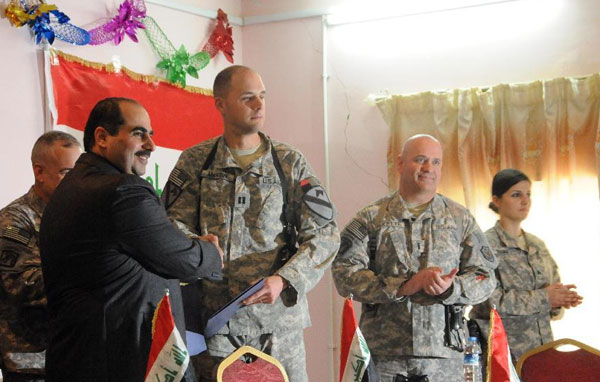US marks end of military mission in Iraq
 0 Comment(s)
0 Comment(s) Print
Print E-mail
Xinhua, December 16, 2011
E-mail
Xinhua, December 16, 2011
U.S. officials on Thursday formally announced the end of Iraqi war after nearly nine years of invasion that toppled former Iraqi leader Saddam Hussein and resulted in the killing and wounding of hundreds of thousands of Iraqis.
|
|
|
Hussein al-Asadi, a representative from Iraqi Prime Minister, and U.S. Army Captain Timothy Martin shake hands during a ceremonial handover of Camp Echo in Diwaniya, Iraq, Dec. 14, 2011. Camp Echo is the 504th military camp handed over from the U.S. to Iraqi military forces. There is only one more camp left to be handed over before Dec. 31, the deadline of the withdrawal of the U.S. troops in Iraq. [Xinhua] |
U.S. Defense Secretary Leon Panetta, who arrived earlier in Baghdad to mark the ceremony that ends U.S. military operations in Iraq, said that "Your dream of an independent and sovereign Iraq is now a reality."
The ceremony, starting at around 1:00 p.m. (1000 GMT) as several helicopters were providing air cover, was carried out by the last U.S. military unit in Baghdad at the last military headquarters near Baghdad airport which was the first site that was occupied in Baghdad by U.S. forces in 2003.
"This is now an Iraq with whom the U.S. will continue to work with in every way possible," said James Jeffrey, the U.S. ambassador to Baghdad, after the U.S. troops cased their flag.
The ceremony was also attended by General Lloyd Austin, the commander of U.S. forces in Iraq, General Martin Dempsey, the chairman of the Joint Chiefs of Staff and Iraqi military's chief of staff Lieutenant General Babaker Zebari and defense ministry spokesman Major General Mohammed al-Askari.
"Iraq will be tested in the days ahead by terrorism and by those who would seek to divide it, by economic and social issues, by the demands of democracy itself," Panetta warned.
He reiterated a pledge by U.S. President Barack Obama that his country plans to keep strong diplomatic presence in Iraq and maintain powerful military presence in the region.
"We will continue to help Iraq address violent extremism and defend against external threats. We will continue to have a robust and enduring military presence across the Middle East," Panetta said.
"Today, some five years later, and after a lot of blood spilled by Iraqis and Americans, the mission of an Iraq that could govern and secure itself has become real," Panetta said, adding that "the Iraqi army and police have been rebuilt. Violence levels are down. Al-Qaida weakened. Rule of law strengthened. Educational opportunities expanded, and economic growth expanding."
For his part, Austin recalled in his speech the time when he gave orders for his troops to cross the border into Iraq in 2003, saying that he will now see his troops leave the country.
Panetta is scheduled to meet with Iraqi top officials to discuss fully withdrawal of U.S. troops from the country.
This is Panetta's second visit to Iraq since he took office as the U.S. defense secretary.
Since August, the U.S. troops have dramatically withdrew from more than 500 military bases and as for Thursday, there are roughly 4,000 U.S. troops remained in the country, who are scheduled to completely depart the country within days ahead of the withdrawal deadline of Dec. 31.
According to a security pact named Status of Forces Agreement ( SOFA) signed in 2008 between the United States and Iraq, all the U. S. troops are scheduled to pull out of Iraq by the end of 2011.
Also on Thursday, violence continued in Iraq as five people were killed and five others wounded in two motorcycle bomb attacks in Iraq's western province of Anbar.
A booby-trapped motorcycle ripped through central the provincial capital city of Ramadi, some 110 km west of Baghdad, killing three people and wounding three others, the source from Anbar's operations command told Xinhua on condition of anonymity.
Minutes later, a second motorcycle bomb exploded in another district in Ramadi, killing two people and wounding two others, the source said.
Sporadic attacks are still common in Iraqi cities despite the dramatic decrease of violence over the past few years.







Go to Forum >>0 Comment(s)